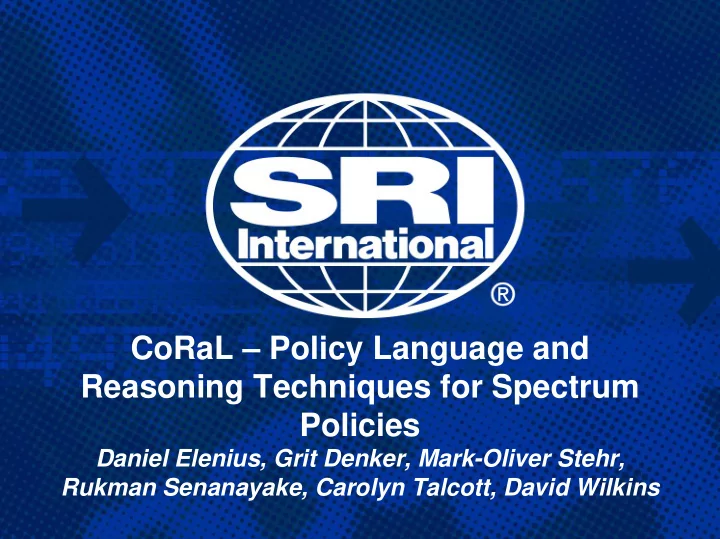

CoRaL – Policy Language and Reasoning Techniques for Spectrum Policies Daniel Elenius, Grit Denker, Mark-Oliver Stehr, Rukman Senanayake, Carolyn Talcott, David Wilkins
Current Spectrum Policy Regime • Policy = natural language document • Policy enforcement – C code compiled into radio firmware • Radio accreditation – Test radio with the compiled-in binary policies against some pre-defined test suite
Problems • Spectrum scarcity • Deployment delays • Policy evolution • Different context – different policies
Solutions • Spectrum sharing • Most spectrum unused • Sensing to avoid interference • Declarative policy language • Load new policies on the fly • Separation of policy enforcement from other radio software • Accredit policy, policy reasoner, and radio software separately
The XG Architecture state of the environment Sensors control msg Policy transmission request data msg Reasoner System (PR) Strategy RF Reasoner transmission reply (SSR) control msg Policy data msg DB Radio
Policy Language Requirements • Accreditability • Extensibility • Expressiveness • Functions • Computations • Orderings
CoRaL Language • Typed first-order logic with equality • Constraint Simplification • Functional approach • To represent functions • Computations inside language • Term rewriting • Ontologies • Algebraic Data Types • Standard set theoretic semantics • Operational semantics
request_params radio req_radio req_transmission Radio req_evidence powermask Detector SignalDetector MaskShape ContinuousSignalDet Powermask PeriodicSignalDetector LocationDetector evidence signal TimeDetector MessageDetector Evidence Signal RadioCapability SignalEvidence RadarSignal ProcessCapability LocationEvidence TVSignal TimeEvidence NTSCSignal transmission PALSignal SECAMSignal BeaconSignal Transmission Legend: ontologyName Time basic_types Message geo Type Subtype Bandwidth Message TimeInstant Location Frequency TimeDuration GeographicArea Power … … Threshold Precision timeDifference distance timeBefore locatedIn Evidence timeAfter containsLocation Transmitter timeDurationLessThan … Detector inTimeDuration …
Policy Examples 1/2 Allow to transmit in the band 5180 MHz to 5250 MHz, if the radio is at most 10 km away from the geographic coordinates 39 10’ 30” N, 75 01’ 42”, and only between 06:00 and 13:00 local time. policy p1 is use request_params; allow if centerFrequency(req_transmission)in {5180.0 .. 5250.0} and (exists ?le:LocationEvidence) req_evidence(?le) and distance(location(?le),loc1) =< 10000 and (exists ?te:TimeEvidence) req_evidence(?te) and hour(timeStamp(?te)) in {6 .. 12}; end
Policy Examples 2/2 Prohibit transmission if peak sensed received power is more than -80 dBm : policy p2 is use request_params; disallow if (exists ?se:SignalEvidence) req_evidence(?se) and peakRxPower(?se) > -80.0; end
Logical Approach If PR can prove policies, facts from SSR ├ permit Then transmission is allowed
Permissive and Restrictive Policies • Policies contain axioms about allow and disallow • A “meta-policy” relates permit to allow and disallow • Typically, permit iff allow and not disallow • i.e. restrictive takes precedence over permissive policies • Other meta-rules can accommodate prioritized policies
Reasoning about Spectrum Policies • Requirements on an ideal reasoner • Interactivity • Underspecified requests • Prolog-based reasoner • Only yes/no answers, no constraints • clp/r • Executable specification in Maude • Current work – efficient implementation of part of CoRaL • Will be implemented on radio hardware
Conclusions • Spectrum domain is highly amenable to a policy approach • Special requirements on the policy language • Special requirements on the reasoner
Recommend
More recommend